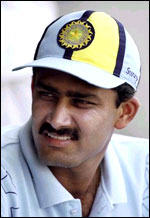 Home > Cricket > Diary archives
Home > Cricket > Diary archivesAugust 27, 2001
"A system in place"
Faisal Shariff"I started my presentation after Kaif hit the winning runs… that gave me a lot of confidence and also lesser time to finish everything off," joked Anil Kumble, chief architect of the contract system, which the senior cricketers (read Anil Kumble, Javagal Srinath, Rahul Dravid, Sourav Ganguly and Sachin Tendulkar) clinched over the weekend.
With the contract system now in place, the top 20 players in the country will, beginning with the South African tour this October, be paid a lump sum apart from their match fees.
"The best part of the system is that the game becomes incentive-based from here on," argues Kumble, whose presentation was described by several board officials as "brilliant".
 Though the details are yet being worked out, the overall goal is clear --
performance now becomes king, and the players are given every incentive to
play well, to produce results.
Though the details are yet being worked out, the overall goal is clear --
performance now becomes king, and the players are given every incentive to
play well, to produce results.
Kumble's own case has been one of the best arguments the senior cricketers have had, in arguing their case before the board. The leg spinner, India's main match-winner for the best part of the decade, found himself absolutely in the cold following a shoulder injury.
"Earlier, Sri (Srinath) had missed out and then I suffered the same fate," Kumble points out. "It made us realise that there was absolutely no security for the players. I spoke to the other senior guys in the team, we found we were all in agreement, so we started off the process of discussing it with the board, which was equally keen.
"We did not want a situation where some player plays his heart out for the team, gets injured in the process, and finds himself out in the cold. It is sad that at this point in time, Laxman, Sachin and Nehra are injured and sitting out. The good thing is that from next year onwards, that won't be the case."
Anil, along with Rahul Dravid, examined the player payment structure and then restructured the whole system.
The main consideration was to provide a monetary safety net for the players, to put in place a system that told them, do your best and if you get into trouble, you will be looked after.
"The beneficiaries of this system will be consistent players who add value to the team," Kumble points out. "There is now an incentive to work even harder, for the team bonus."
Since India differs in size and population from other Test- playing nations like Australia and South Africa, the players could not draw on an existing model for ideas. They did examine the models prevailing in those two top nations, but couldn't implement them as is because that would mean having to contract 350 state-level players as well, which would at least initially have proved impossible.
Thus, Anil, Rahul and the other seniors went to work to tailor a system that would work within the Indian framework keeping in mind the interest of the board as well as of the players in mind.
The big myth propagated by those who opposed the system was that players from outside the pool of twenty were not eligible for selection, which they said meant that rising young players would have no hope of making the big time.
 "The fact, though," argues Anil, "is that when looking at a player you first
look at the pool of twenty, but if you need to you also go outside to pick a
player who has shown brilliant form in the domestic circuit. In the case of
selections from outside the pool of 20, you pay the player his match fees,
and that is that. Then, when you pick the next pool -- which will be done
every September -- you look at this player's performance and include him in the pool, it is as simple as that."
"The fact, though," argues Anil, "is that when looking at a player you first
look at the pool of twenty, but if you need to you also go outside to pick a
player who has shown brilliant form in the domestic circuit. In the case of
selections from outside the pool of 20, you pay the player his match fees,
and that is that. Then, when you pick the next pool -- which will be done
every September -- you look at this player's performance and include him in the pool, it is as simple as that."
Another big plus is that now, those playing in domestic tournaments will also earn more and again, these earnings will be incentive based. No longer can players play drab cricket for personal milestones -- under the new system, you earn more if you win a game, thus giving teams a reason to move away from the old mindset where getting the first innings lead was all that mattered.
"The system will call for an attitudinal change, which is imperative," Kumble says. "The players will work even harder on their game, on their fitness. They now realise that there is substantial money involved in the sport, which can be translated into security and stability without however producing complacency."
Kishen Rungta, treasurer and member of the finance committee, pointed out that growing recession meant that the board had to do something to make cricket attractive as a profession, if young people were to take to it. With enhanced payments at the domestic level, that has now been done, Rungta pointed out.
"Jobs for cricketers are dwindling by the day. Corporate houses aren't offering jobs to domestic cricketers easily anymore, " argues Kumble.
"I think that in this whole issue, the board has performed admirably, with an open mind and a receptive attitude. They had been thinking aloud about the graded payments scheme, which was married with the contract system to give the whole arrangement a logical method," says Kumble. "I had a very fruitful meeting with the finance committee where I made my first presentation to the board representatives, treasurer S K Nair and Mumbai Cricket Association's honorary secretary Prof. Ratnakar Shetty, and then with board president Dr A C Muthiah, who seconded the proposal and was very receptive to our views."
Anil makes it clear that it is not exclusively his doing, and that the other senior players were equally involved. "It is just that they were playing a lot, while I was in India nursing my shoulder, so I had the time to represent them in the meetings with the board," Kumble says. "I kept in touch with the players, wherever they were, we discussed each step. Rahul (Dravid) would take the messages from my side, pass it on to the other players, get their views and pass them back to me. Also, Sachin (Tendulkar) kept in touch via emails about the proposal when I met the board recently to discuss payments for domestic players, and the fact that Sunil Gavaskar, head of the technical committee, backed the system helped us as well."
"I must add," says Kumble, "that the media too played its part in this whole thing, by supporting the players and pointing out that there was an issue to deal with."
Illustration: Dominic Xavier
Also read: Bouquets for the BCCI
©1996 to 2001 rediff.com India Limited. All Rights Reserved.